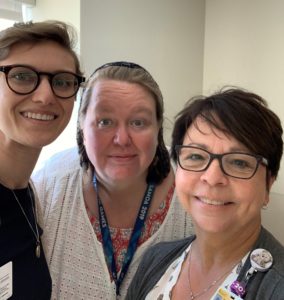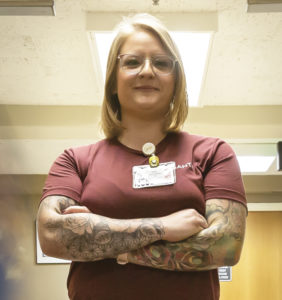Share:
Spotlight on Asante Palliative Care
Imagine your ailing mother is in the hospital with a complication from COPD. Her death isn’t imminent, and she’ll likely be discharged home, so you talk about other things to cheer her up. You don’t mention the medications, wheelchairs and oxygen tanks that await as the disease progresses. You don’t ask how she wants to live the remaining years or months of her life. Such talk might scare her. So you wait … and then it’s too late.
This lost opportunity is where palliative care comes in. The aim of this medical specialty isn’t necessarily to extend a patient’s life or to ease the dying process, but to help patients with life-limiting illness or a life-changing event such as stroke make the most of the life they have.
At ARRMC, the only Asante hospital with an inpatient palliative care team, care starts with having the hard conversations, no matter what stage of the person’s illness. Do they want further cancer treatment that might buy more time, or do they want to focus on the quality of the time they have left? Do they want medication to ease their pain even if it clouds their thinking, or is it more important to them to remain clear-headed to visit with their grandchildren?

Kate Westmoreland, MD, physician for Asante Palliative Care Services, calls these conversations “anticipatory guidance.” It’s something she and her small team at ARRMC do every day with patients diagnosed with a serious illness such as cancer, congestive heart failure or Alzheimer’s disease.
Palliative care is a bridge of sorts between hospital medicine and hospice care, which helps patients typically in their final six months. Palliative care’s goal isn’t to make lives longer, although the service can be provided along with curative treatments, but to make them fuller.
This may include providing relief from symptoms, pain, stress and emotional suffering. And sometimes it involves compassionate candor to help patients and their families have the difficult conversations they might overwise avoid.
“We help patients and their families navigate complex decisions,” said Sharon Krische, a nurse practitioner with the inpatient palliative care team. “They’re usually at a crossroads where some decisions need to be made and they’re usually tough decisions.”
Although patients receiving palliative care may go on to live another 20 years, many have conditions that are likely to shorten their lives. Rene Miller, an oncology nurse, has learned through experience that the time to talk about a person’s death is when they’re relatively healthy.
“Since I started nursing, the one thing I found on a consistent basis is the conversation about death or decline does not happen until the end of life,” she says. Palliative care encourages these talks “when everyone involved isn’t fraught with high emotions.”
ARRMC’s palliative care team is there not just for the patient and families, but also for the clinical staff who may be uncomfortable having difficult but necessary conversations with patients about their goals of care.
As medical advances allow patients to live longer with serious illnesses, the need for palliative care is growing nationally and locally.
“We are working toward expanding services at all three hospitals,” Dr. Westmoreland said. A steering committee is being formed to build out the service, including to Asante Ashland, which is seeking to become an Age-Friendly hospital specializing in caring for older patients.
WHO IS ON A PALLIATIVE CARE TEAM?
- A physician or nurse practitioner specializing in complex pain and symptom management who has received additional training in communication around complex medical choices facing patients with a serious illness.
- A hospice and palliative care nurse with specialized training and experience in serious illness and coordinating care in the hospital setting.
- An advanced hospice and palliative care social worker with expertise in navigating the emotional and spiritual meaning of life cycle events and the interpersonal issues they raise for individuals and their families.
- Chaplains with specialized training, who provide spiritual and emotional support for patients and their families regardless of faith background.
- Music thanatologists who provide musical comfort.
If you have a question, please contact the author or relevant department directly.



